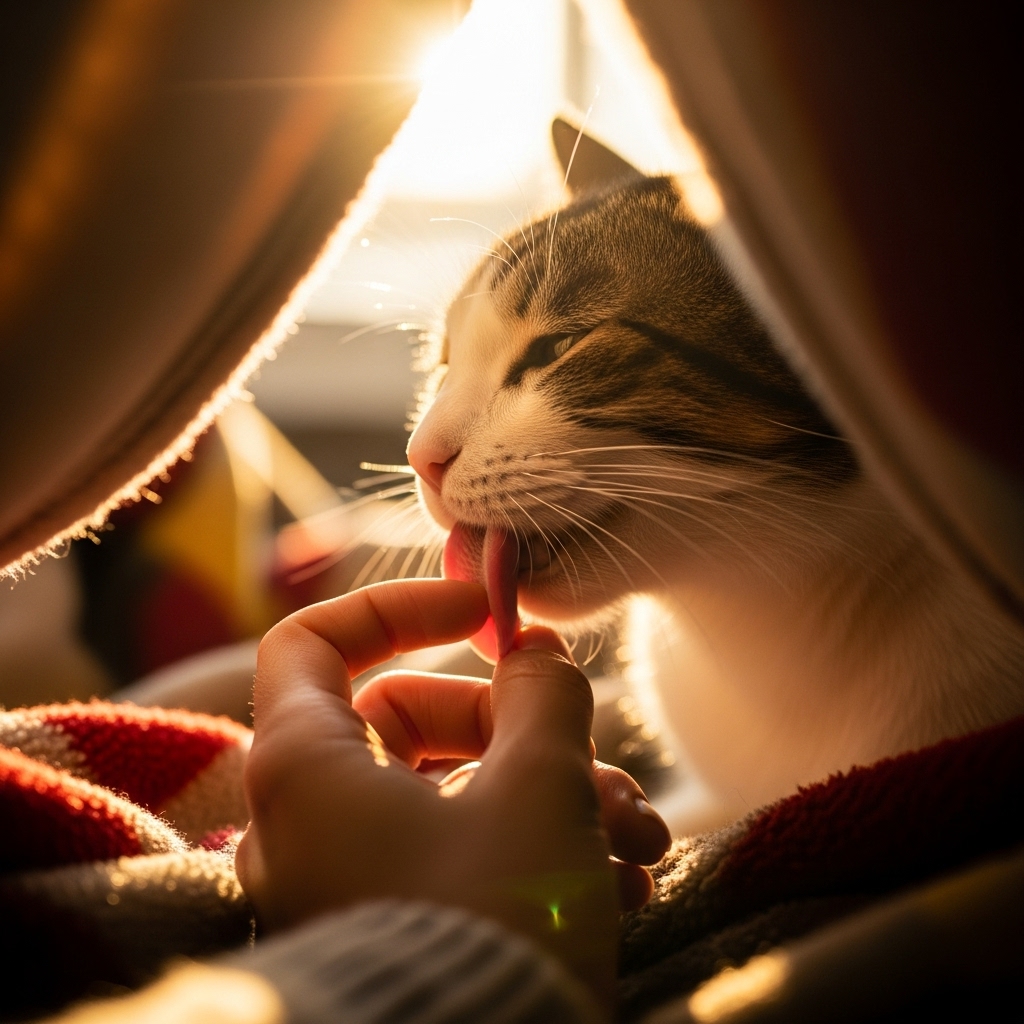Introduction
Have you ever wondered why your feline friend showers you with affectionate licks? As a cat lover and owner myself, I’ve often found myself pondering over the meaning behind this behavior. Cats have unique ways of communicating with us, and their lick-filled displays can convey various messages. In this article, we’ll delve into the intriguing world of feline behavior to unravel the secrets behind why cats lick and what it signifies.
The Language of Licks: Understanding Cat Behavior
Cats: Mysterious and Complex Creatures
Cats have always captivated humans with their enigmatic nature. They possess a rich repertoire of behaviors that can leave us both puzzled and fascinated. When it comes to licking, these graceful creatures have a multitude of motivations that range from social bonding to grooming rituals. Let’s explore the significance of cat licks and decode their hidden meanings.
Social Bonding: A Lick of Love
When a cat licks you, it’s often a gesture of affection and social bonding. Kittens, in particular, learn this behavior from their mother during their early stages of development. The mother cat grooms her offspring through licking, not only to keep them clean but also to strengthen the emotional bond between them.
As adult cats, this grooming behavior translates into their interactions with humans and other cats they consider part of their social group. By showering you with licks, your feline friend is essentially extending their trust and acceptance, considering you as an integral member of their chosen family.
Grooming Rituals: Keeping It Clean
Cats are renowned for their meticulous grooming habits. You may often observe them methodically cleaning their fur with their tongue, ensuring it remains pristine. Similarly, when a cat licks you, it may be their way of returning the favor, considering you part of their grooming routine.
By grooming you, cats are displaying their social attachment and caring nature. They might be attempting to remove dirt or scents that are unfamiliar to them, signaling their desire to establish a familiar scent profile within their social circle.
Marking Territory: Claiming You as Their Own
Believe it or not, licking can also serve as a form of marking territory. Cats possess scent glands on their tongues, which they use to deposit their unique scent on objects and individuals they consider part of their territory. When your feline companion licks you, they are essentially claiming you as their own, marking you with their scent and signaling to other cats that you are under their guardianship.
This marking behavior is particularly prominent during periods of stress or anxiety when cats feel the need to reinforce their territorial boundaries. By licking you, they seek comfort and reassurance, ensuring that their safe space remains intact.
Decoding the Messages: What Does Your Cat’s Licking Behavior Signify?
Lick Frequency: From Occasional to Obsessive
The frequency of your cat’s licks can provide insights into their motivations. Understanding the varying degrees of licking behavior can help you interpret the messages your cat is trying to convey. Here are some scenarios to consider:
Occasional Licks: Affectionate Gestures
If your cat licks you sporadically or in specific situations, such as when you return home after being away, it’s usually a sign of their affection and excitement. These occasional licks are their way of expressing happiness and welcoming you back into their company.
Excessive Licks: Attention-Seeking Behavior
On the other hand, if your cat engages in excessive licking, it could be a form of attention-seeking behavior. Cats, like humans, have their unique personalities, and some individuals might resort to excessive licking as a means to gain your attention or communicate their needs. In such cases, it’s essential to observe your cat’s overall behavior to identify any underlying issues that might be driving this behavior.
Stress-Induced Licking: An Outlet for Anxiety
Stress and anxiety can manifest in various ways, and excessive licking is one such outlet for feline anxiety. Cats may resort to compulsive licking as a self-soothing mechanism during times of stress. If your cat’s licking becomes obsessive or begins to cause skin irritation or fur loss, it’s crucial to consult with a veterinarian to address the underlying cause of their anxiety.
Location, Location, Location: Where Your Cat Licks You Matters
The areas your cat chooses to lick can also provide clues about their intentions and emotions. Here are some common areas cats tend to focus on:
Face and Head Licks: Affection and Trust
When your cat licks your face or head, it’s a sign of endearment and trust. These intimate licks symbolize their acceptance of you as part of their social group. By grooming your face, they express their love and affection, reinforcing the bond between you.
Hand and Arm Licks: Social Connection
Cats often engage in licking behavior towards your hands and arms. This act represents their desire for social connection, acknowledging your presence and reinforcing the bond between you. They might also be grooming your hands, just as they would groom their own fur, expressing their trust and acceptance.
Leg and Foot Licks: Affectionate Solicitation
If your cat is licking your legs or feet, it might be their way of soliciting attention or seeking affection. By targeting these areas, they are signaling their desire for interaction and are using their licks to engage you. Paying attention to them and reciprocating their affection can further strengthen your bond.
Do All Cats Lick Equally?
Just as each cat has a unique personality, their licking behaviors can also differ. Some cats may be more inclined to lick as a form of communication, while others might express their affection through alternative behaviors. Understanding your individual cat’s preferences and tendencies will help you better interpret their messages and respond accordingly.
Conclusion
Cats possess a language all their own, and their licks are just one aspect of their intricate communication system. From expressing affection to establishing social bonds and marking territory, cats employ licking as a multifaceted behavior that conveys various messages. By observing your cat’s behavior and paying attention to their licks, you can gain a deeper understanding of their emotions and strengthen the bond you share. So, next time your feline friend showers you with licks, remember that it’s their unique way of saying, “You’re special to me.”
Remember, each cat is an individual, and their licking behavior may vary. If you have concerns about your cat’s behavior, it’s always a good idea to consult with a veterinarian or a professional animal behaviorist who can provide personalized advice and guidance.
Useful resources:
- Cat Behavior: What Is Your Cat Trying to Tell You?
- Understanding Your Cat’s Body Language
- Why Do Cats Groom Each Other?

